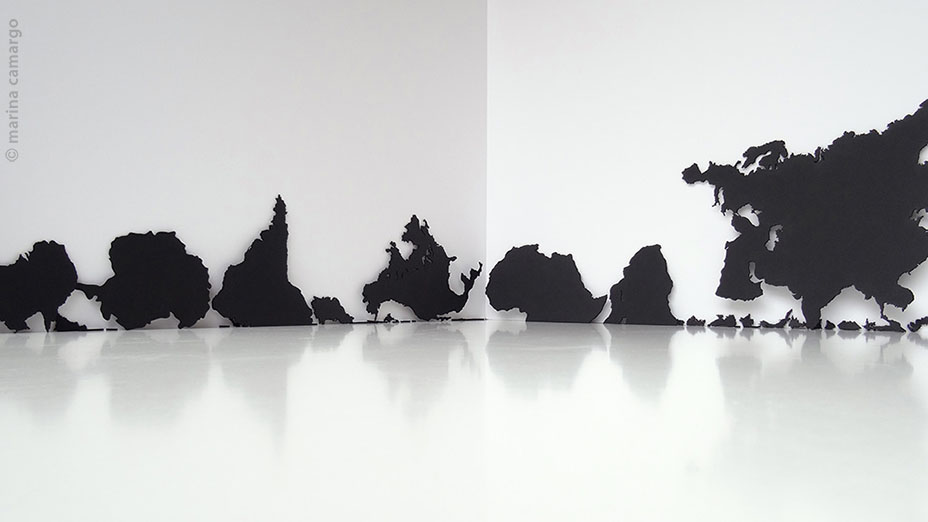On the term Global South
The Global South - a relational concept
We propose to use the terms Global South and Global North as relational concepts in order to overcome prevailing but nowadays inapt geographical and geopolitical classifications of the world, such as center and periphery, developed and developing countries or first and third world. In our reading, Global South/Global North are not defined by clear spatial boundaries but rather as emergent topographies of historically evolving and overlapping networks of exchange, of dominance and exclusion, and of identity ascriptions. By liberating the concepts from their geospatial connotations, we acknowledge that the Global South can be found in the geogra-phic north, and vice versa. As a relational concept Global South can help to address the internal inequalities of countries and territories across the world. It describes the increasing political, cultural, and epistemic marginalization of people not able to profit from the benefits of globalization.
Global South - definitions
Nina Schneider (2017)
"The Global South has a slippery nature and it is a challenge to satisfactorily define the term. Currently, we face two problems: First, various and utterly different definitions coexist but their differences are usually conflated in the scholarly and political discourse. Second, we lack precise conceptualizations and vague usages are common. Most dictionaries still lack an entry dedicated to the Global South and only offer related terms such as “development” or Third World. One exception is TheInternational Encyclopedia of the Social Sciences which holds an entry on “North and South, the (global).” The author clarifies right at the start that “there is no precise definition of either term” (North or South), that the terms are geographically imprecise, and that some countries are difficult to label (Butler 2008, 542).This article distinguishes three concepts of the Global South. While I have offered a detailed characterization of the three readings elsewhere (Schneider 2018), here I will focus on the different utopian projects pursued by each of the readings and their possible effects. The first and most common usage of the Global South can be called the geographical reading. It locates the South in those world regions that formerly constituted the Third World and are conceived of as structurally underdeveloped and poverty-struck: Latin America, Africa, and Asia. The few dictionary entries (like Butler’s), power-ful supranational institutions like the United Nations (UN), and a recently launched Springer journal Bandung: Journal of the Global South use this geo-graphical definition. The object of study includes these regions’ trade rela-tions, socio-economic developments and problems, and lack of geopolitical maneuvering space at a supranational level (for example, within the United Nation system). Characteristic for this geographical model is that it views the world through the framework of the nation-state and focuses its analysis on inter-state relations. The second model of the Global South has been suggested by Alfred López (2007), the founding editor of the first specialized scholarly journal entitled The Global South.In contrast to the previous notion of the Third World associated with Asia, Latin America, and Africa, López’s South relates to the “subalterns” across the globe: human beings disadvantaged by neoliberal policies who are socially, politically, and intellectually disempowered. They are “global” because they can no longer be confined to a single region.Lastly, a group of scholars (McEwan 2009; Sparke 2007) has offered var-iations of a third conceptualization that by and large understands the Global South as a flexible metaphor that defies any geographical or social fixation but is relational. This third reading marks a metaphorical yet locally appli-cable dividing line between a supposed powerful North and a deprived and dependent South. To provide an example, it could be related to the border line between the Northern and the Southern United States or Denmark and Rwanda. This third version will be less discussed in this piece given that it is “flexible.”" (p. 20-21)
Schneider, Nina: "Between Promise and Skepticism: The Global South and Our Role as Engaged Intellectuals", in: The Global South, Volume 11, Number 2, Fall 2017, pp. 18-38
Sinah T. Kloß (2017)
"(...) I propose to nuance the idea of the Global South as a process that reflects, highlights, and potentially transforms dominant and subalternized positionalities. The Global South should be understood as a process and practice, created and influenced by the ever-changing and never fixed status positions of persons and institutions. In the context of academic institutions, we may want to embrace the idea of the Global South as a process or practice through which new modes of knowl-edge production are created and established modes of reproducing inequalities, “epistemicide” (Sousa Santos 2014), and “epistemic racism” (Mignolo 2015, xv) are unlearned. I thus propose to consider the idea of the Global South as an active practice that restructures global networks of power. The Global South may even be considered as a practice that facilitates liminality—a liminal space of transition in which a phase of anti-structure enables the re-organization of, for example, social and epistemological power relations, and which creates a new model of social, economic, and political interactions that relies on egal-itarian principles." (p. 8)
in Kloß, Sinah Theres: "The Global South as Subversive Practice: Challenges and Potentials of a Heuristic Concept", in: The Global South, Volume 11, Number 2, Fall 2017, pp. 1-17
Hollington, Salverda, Schwarz, Tappe (2015)
"Where and what is the Global South? If you ask people on the street, many would probably not have the faintest idea. In everyday parlance and mass media, Global South has hardly become a household term. In academic and (global) policy circles, though, the term is used with much more gusto. Politicians refer to it. The United Nations organize their statistical data in accordance with the term. Academics write books about it - or, as in our case, explicitly include the term in the name of a research center: Global South Studies Center (GSSC).
But what does the term entail? Who uses it and why? And what are the implications of marking distinctions between the Global South and the Global North?"
Hollington, A., Schwarz, T., Tappe, O. and Salverda, T.: "Introduction", in: Concepts of the Global South".Voices from Around the World, 1, 2015.


